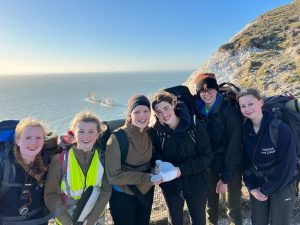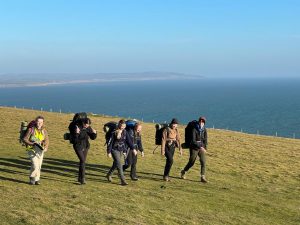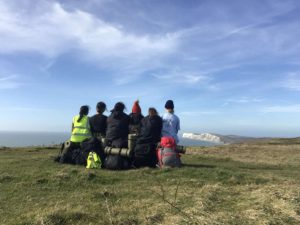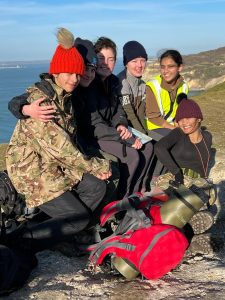Tunbridge Wells Girls’ Grammar School Combined Cadet Force
Gold Duke of Edinburgh Expedition 24th – 28th February 2022
Ulysses Trust Expedition Grant Number 2847
Authors: Captain Graham Naismith & Lance Corporal Layana Joshy
The Duke of Edinburgh Gold Expedition is the highlight of the arduous Duke of Edinburgh Gold Programme. It requires participants to immerse themselves in new volunteering, physical, skills and residential activities before embarking on the four-day expedition.
Covid 19 and an easing of regulations around this has meant that the expedition conditions are currently not as complex as they have been pre-Covid. However, at Tunbridge Wells Girls’ Grammar School (TWGGS) Combined Cadet Force (CCF), waiting for the expedition format to go back to its old structure was difficult to justify.
With the practice expedition safely under their belts from the previous autumn, 12 cadets left Tunbridge Wells on Thursday 24th February 2022 and “set sail” for the Isle of Wight to undertake four days of navigation and aim fulfilment. Although they don’t currently have to camp-out, they still need to walk, navigate and have an aim to fulfil during the course of the four days. With the 12 cadets split into two groups, one of the groups came up with putting together a training video of hints and tips for other candidates and the other looked at analysis of morale changes throughout a long expedition.
So with an early ferry, arrival at camp, unpacking and some final lessons and prep on navigation and signals, the cadets were ready. Over the course of the following 4 days, they were introduced to a number of tasks such as individual orienteering, orienteering in pairs and navigating as a group. For a group of cadets that had barely been outside for the preceding 2 years and were suffering from skill-fade, it was for some a nerve-wracking experience on the steep and sometimes complex Isle of Wight landscape. During the course of the expedition, they needed to carry full packs, put up bashas (army tents) and cook their army ration pack meals using small hexamine cookers.
Although Napoleon will have you think otherwise, an army matches on its feet so time was devoted to foot care and blister prevention. It wasn’t all navigation and walking with a treasure hunt forming part of Day 4 as cadets had to have their eyes peeled for a list of items such as red post boxes, police cars, farm animals etc. At one point, in the aftermath of Storm Eunice, one of the groups came across a fallen bramble tree on a narrow path. As Royal Engineers, the cadets quickly came up with a brilliant idea to build a bridge over the tree using their rucksacks to get over it! Another group were delighted to come across a cute, kiss-blowing pig!
Of paramount importance throughout the expedition was cadet safety. Mobile phones aren’t permitted to be taken and used so it’s critical that the cadets have a method of reporting in and getting help if requested. To this end the Ulysses Trust provided funding for walkie talkie radios for each cadet and payment to an adult communications specialist volunteer who provided additional comms training and an external aerial to improve the signal. As a result, the ability for the cadets to make contact with staff in an emergency was maintained and thankfully not required.
Overall a tremendous success in, what was for us, unfamiliar surroundings.
As Lance Corporal Layana Joshy said “I think everyone that took part would agree that although the trip was a challenge, it pushed us to go beyond our limits to form new friendships, share knowledge and embody the Standards & Values of TWGGS CCF. I would recommend Gold DofE to any cadet who is willing to expand on their cadet experience.”
The main challenge of the expedition was that the cadets were slowly crawling out of Covid. In other times they would regularly be using their navigation skills in anger and working in a group would be the norm. However, despite some initial rust, they proved they still have it and benefited considerably from 4 solid days of navigation to the extent that it is now ingrained in them and no longer daunting. As a unit, we now have more cadets who are able to assist in the teaching of navigation to the junior sections and with practical experience behind them. Furthermore their individual group aims (hints and tips training video of hints and morale changes analysis) will help us considerably in the future.
The Gold Duke of Edinburgh scheme can be very expensive for individuals to take part in, often going into £1000s. By providing this via cadets and with the support of the Ulysses Trust, we were able to give the opportunity to any cadet at a fraction of that price. The success of this will no doubt have a knock-on effect on our recruitment.


































